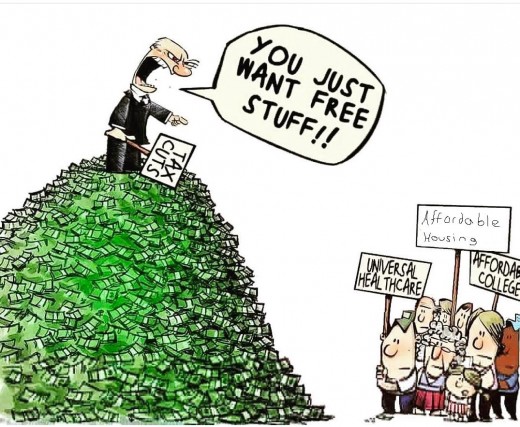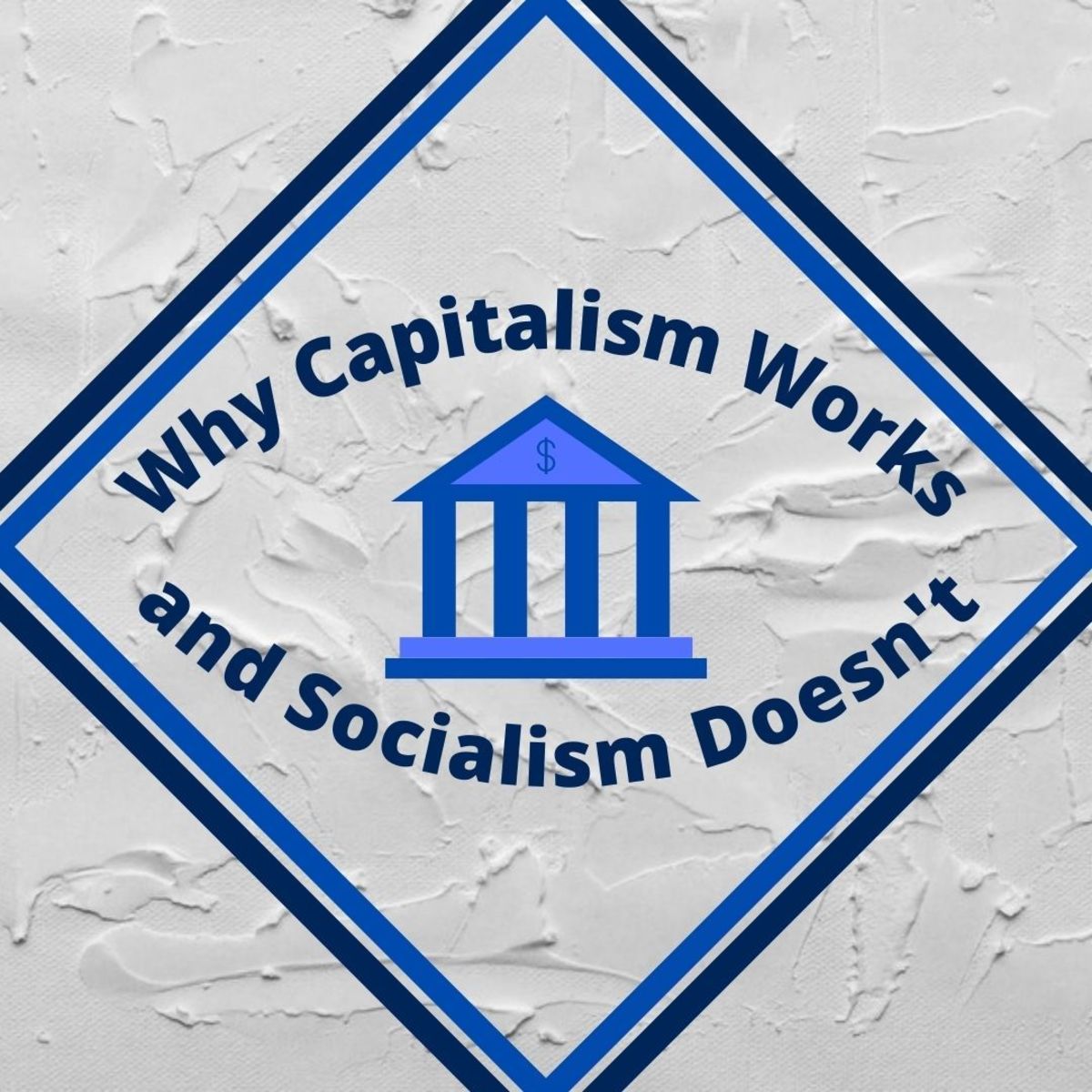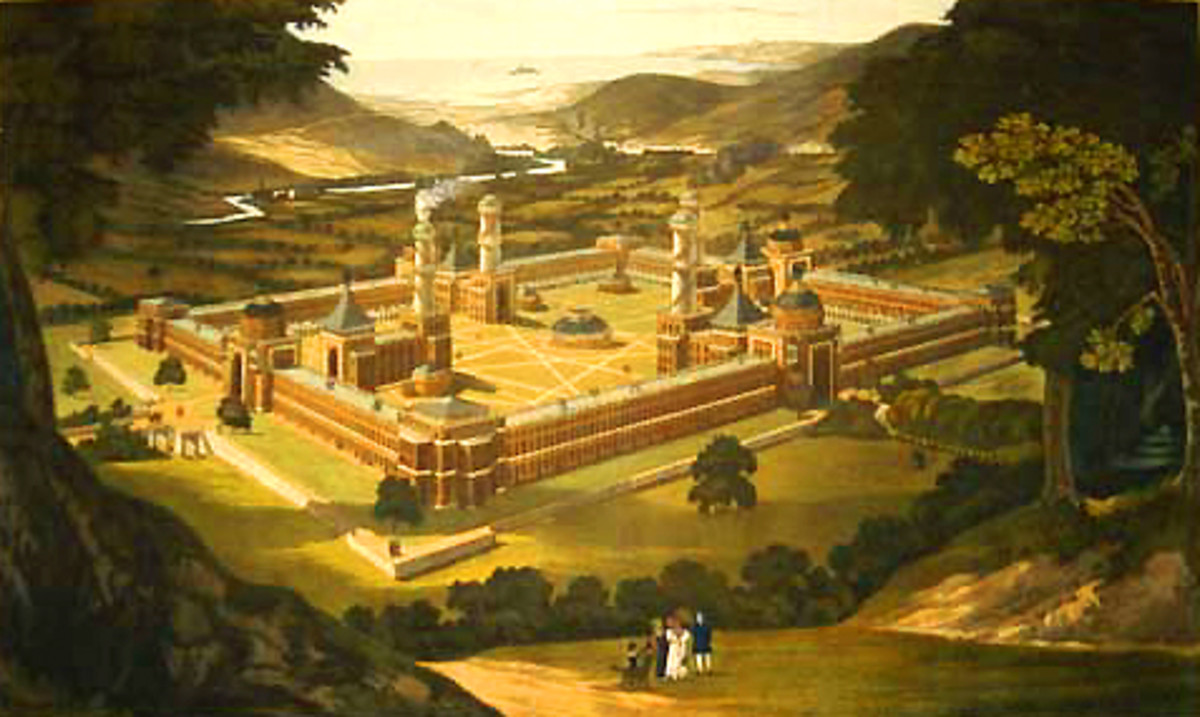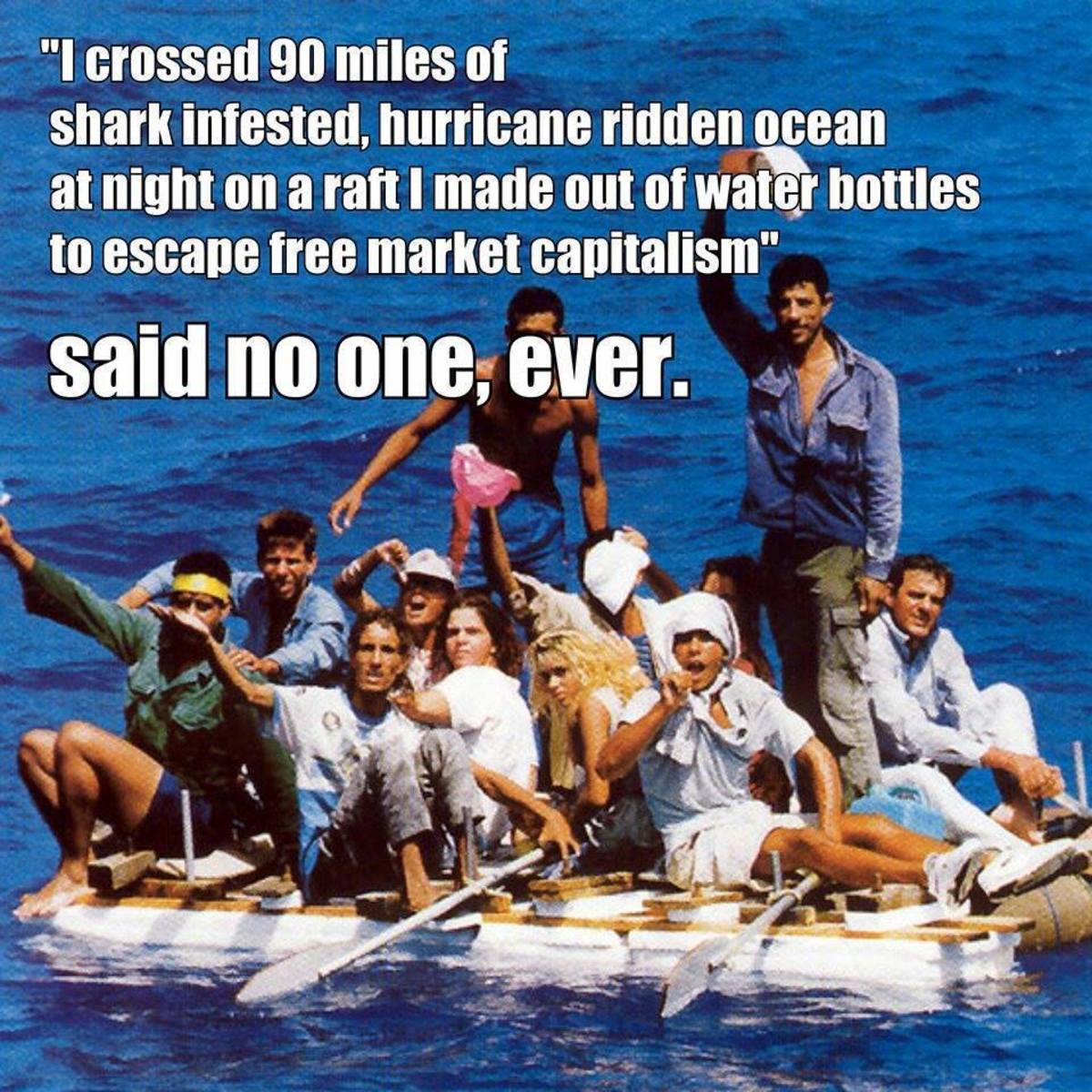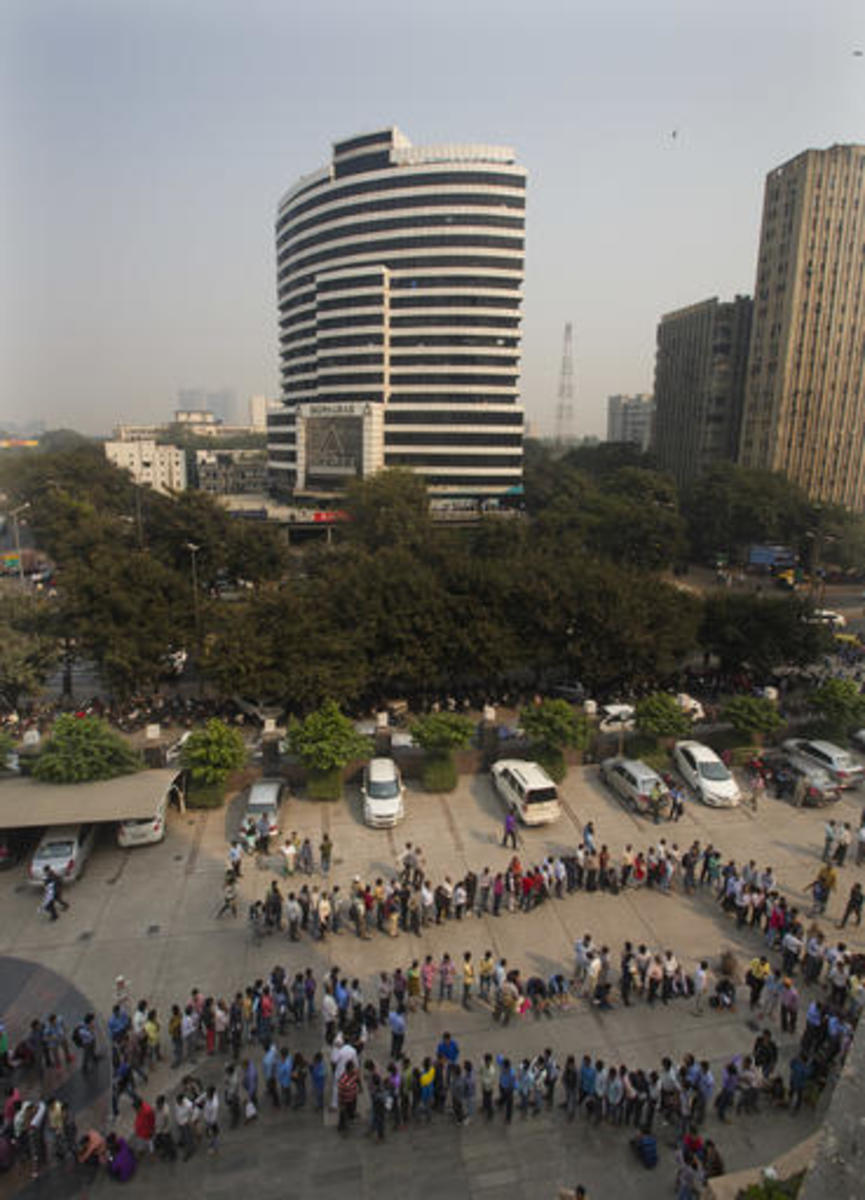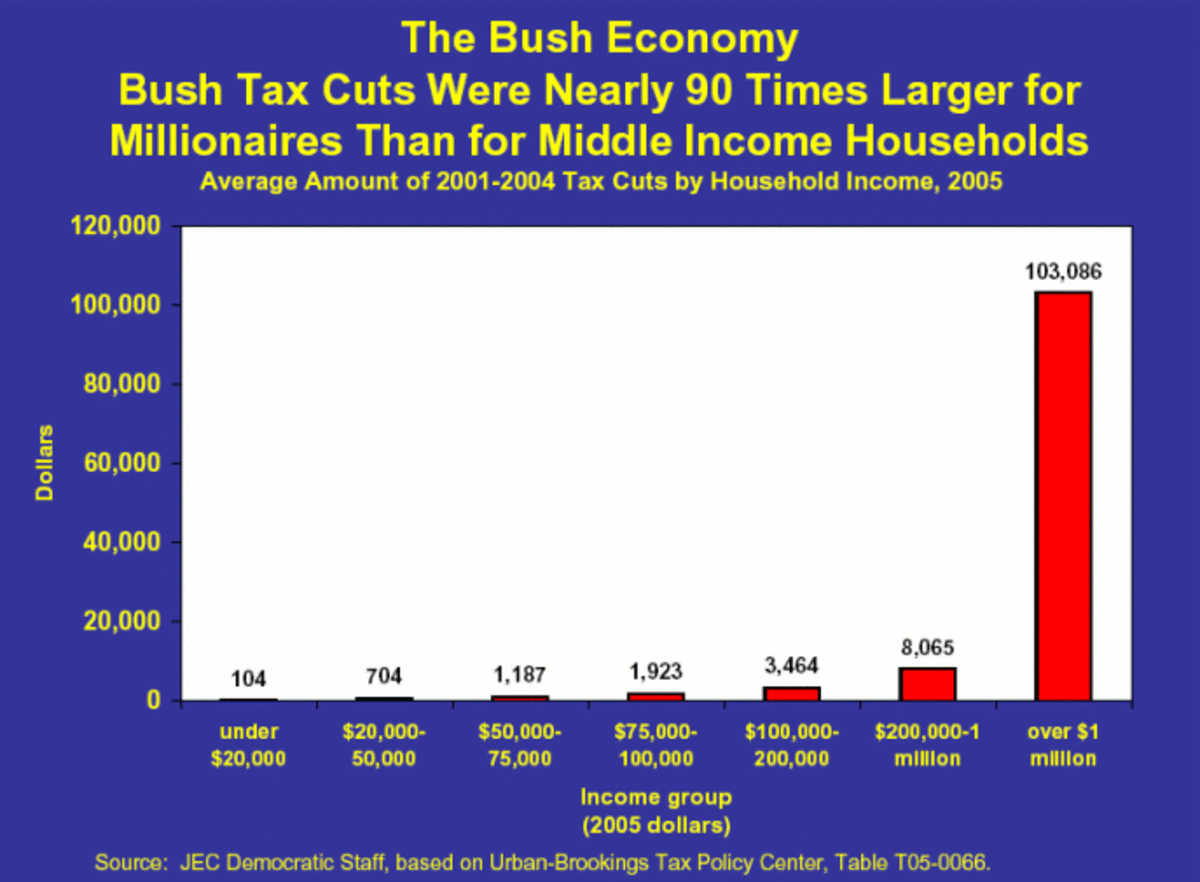Socialism for Them, the Cold Steel Knife of Capitalism for the Rest of Us
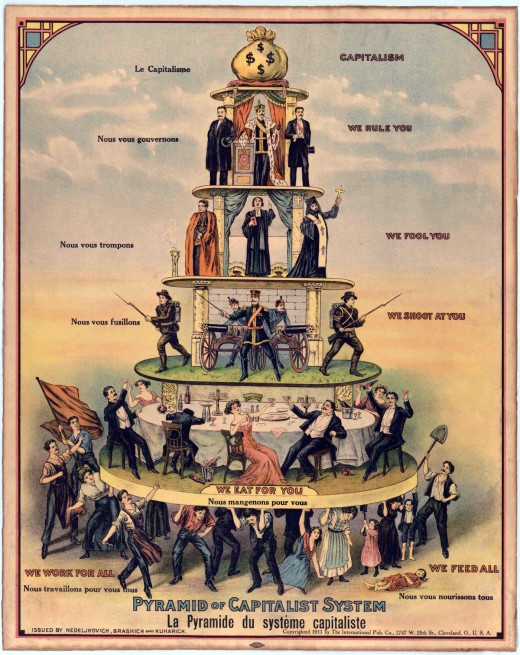
Forget you. I've got mine, dude.
Max Levchin, one of the computer savants who founded PayPal, and an early investor in Yelp, Evernote, and a one-time board member of Yahoo (just to give you an idea of where he’s coming from), has been quoted by breathless media gushings that “socialism doesn’t work.”
This is, like, Moses coming down from the mountain?
A man worth $300 million doesn’t believe in socialism?
Of course he doesn’t.
His kids aren’t hungry.
His family doesn’t have to go without medical care.
He doesn’t have to decide whether to pay the rent or the utility bill, get the car fixed or buy groceries for the family.
If you're so rich, why aren't you smart?
fallacies of thinking
My grandfather used to say – in a kind of good-natured, mocking way – “If you’re so smart, why aren’t you rich?”
If he were alive today, he would ask instead, “If you’re so rich, why aren’t you smart?”
Because what Levchin and other entitled enemies of what they call “socialism” do is make fundamental mistakes of thinking.
Which is a stupid thing to do.
First, they cherry pick their examples of where socialism has failed. Only in this case, it’s rotten-apple picking (as in the single rotten apple spoiling the barrel of otherwise good apples).
They point to a failing economy that has a socialist or quasi-socialist governments -- such as Cuba or Venezuela -- and shout in glee! See! The failures of socialism!
First, such identification is dubious given that much of the economic difficulties in these two nations can be laid at the feet of the United States, which has waged economic warfare of them for years (in the case of Cuba, for more than half a century). It hardly proves the case of the failure of socialism to say that the most powerful quasi-capitalistic economy in the world can wreak havoc on a tiny, poor socialist nation.
But even if that were not the case, certainly, a socialist society can be as mismanaged as easily as a capitalist one, for sometimes capitalism, itself, fails as we can see in the world-wide economic crashes during the 1930’s, and again in 2008. The millions of Americans who lost their homes during the crash of 2008 would not sign an affidavit that capitalist system worked for them. The millions of young Americans now being crushed under $1.5 trillion in student debt would not testify to how well the capitalist system works for them. That two-thirds of bankruptcy filings are due to medical debt does not vouch for how splendidly capitalism distributes benefits all around. Neither do the 45,000 Americans who die each year for lack of medical care testify to the effectiveness of the American system to care for the most basic needs of people in our society.
People in a socialist system can mismanage, overreach, plunder, and steal, just as they can in a capitalist one.
What critics of the socialist path don’t mention is how much worse things might be if the society weren’t socialist. They don’t inquire (or care to know) what conditions drove people – that is, conditions such as existed in Venezuela before the people voted in a socialist government – to try that path?
What they don’t mention is that corrupt governance is corrupt governance, whether “socialist” or “capitalist.” It’s corruption when a politician steals from public funds that were promised to schools and siphons the money offshore. It is also corruption when an oil-and-gas lobbyist is appointed head of the Environmental Protection Agency and promptly declares that his purpose is to protect the oil and gas industry from the environment, and immediately sells rights to drill for oil in a wilderness area to the lowest bidder, which happens to be the company he once worked for.
If you believe in evolution, then the bald eagle and the wild Alaskan salmon should have to prove themselves “fit” enough to fly in smoke-clogged skies or swim in oil-polluted waters.
If they can’t, they aren’t so fit, are they?
The free market becomes the ultimate test of fitness.
Socialism (protecting the places where wild things go) is for the unfit.
But in truth, it ultimately doesn’t matter what label is slapped on corruption.
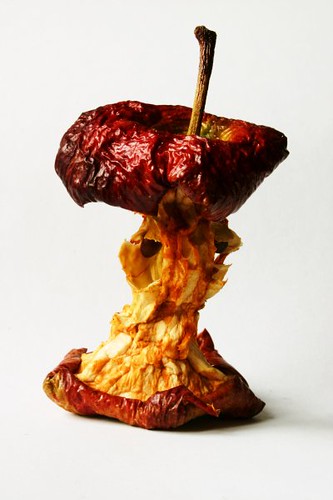
what about the good apples in the socialist barrel?
Those who warn against the evils of socialism never point to social-democracies such as Norway (President Trump’s favorite country) or Denmark, and to a certain extent, Britain, France, Germany, Canada, and several other nations, where people enjoy universal health care, subsidized college tuition, support that buffers those in poverty or suffering homelessness.
They never cry in alarm, “Protect us from being like Denmark, where my kid won’t die because I can’t afford medical care!”
They don’t actually say, “If you can’t afford to buy food, you deserve to die.”
Though that’s what they mean.
But those countries I mentioned are Western, democratic-socialist societies. What about non-Western “socialist” societies? Certainly, they have a dismal record.
Do we need to be reminded of China? That economic “socialist” powerhouse, which has enjoyed a growth rate twice or trice or quadruple that of the West over the past 20 years.
Why don’t the prophets of socialist doom point to China?
Well, that would be inconvenient, wouldn’t it?
Only children believe every choice is all or nothing.
The other way trumpeters of the free market deceive (a way which is related to the above) is they employ what is called in logic the “fallacy of the excluded middle,” or sometimes, a “false dilemma” or a “false choice.”
This is presenting the range or realities as being only between two things, both of which they choose, tantamount to saying, “You can either eat sh*t, or steak. Your choice.”
Whereas in reality, we know there are many things in between to eat.
Critics of “socialist” programs would have us believe that every such program leads axiomatically to utter social and economic disintegration, which is not true.
And not all economies are pure capitalist or purely socialist. As I mentioned above, you can have democratic societies which have “socialistic” elements, and socialist societies which have “capitalist” aspects.
It’s not all or nothing. You can have “mixed economies.” You can have Social Security and private pensions. You can have a public (i.e., “socialized”) police force and private security guards. (Though why you would want somebody who couldn’t pass a civil-service exam showing up on your doorstop in the middle of the night with a semi-automatic weapon is beyond me. But it’s your dollar, your choice.)
You can have public (“socialized”) schools for the 90%, and there are private schools for those who want their children educated in the finer points of dressage (that’s the elite horse competition, including ‘horse dancing’), prescription drug addiction, and a life-long disdain for anybody who is not as rich as they are – the three Ds: dressage, drugs, and disdain – well, there are private schools.
A brief look at “socialist” elements already present in American society:
The fire department – doesn’t have to be socialized; in the early 1800s in America, the fire departments were private. Home owners would contract with a fire company. Companies would compete for homeowners’ business. Sometimes, rival companies would block each other from saving a house. If there was a fire, the fire department would check for the medal medallion on the front of the house. If you had one for their company, they would put out your fire. If you didn’t, they would stand by and watch your house would burn down.
Oh, the glories of the free market system!
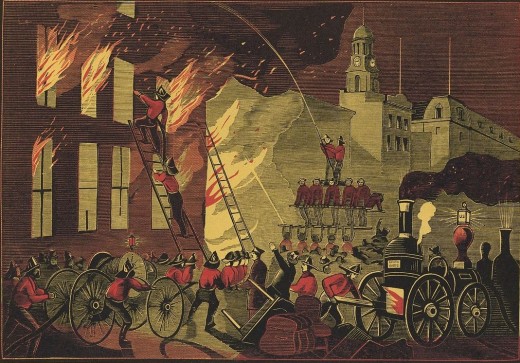
Public schools -- At various times in Western societies and in many countries today, schools were totally private. Today, in the United States 90% of all students in kindergarten through high school are educated in free public schools. If this socialized system did not exist – and let’s say, there would be no “socialist” subsidy whatsoever for tuition -- parents would have to pay by themselves the roughly $10,000 to $25,000 dollars per year per child for their school tuition (public school spending per student, depending on state of residence). Given that the average American household income is $61,000 per year, the “average” American family would be able to send perhaps three children to school, though they would have any money left over for food or shelter, much less wide screen TVs.
I believe the result would be that the rich would educate their children, while the working “average” people would opt to eat.
But that’s the “invisible hand” of the market place selecting the winners and losers! You’re a winner if your daddy is rich; you’re a loser if you’re anybody else.
The military was once largely privatized. For those of you who remember your history, you might have heard of the Hessians that King George sent over to fight against the Americans during the American Revolution. The Hessians were German mercenaries. They had no loyalty to England or to America, actually to nothing but their own pocketbook. This practice was once quite common but became less so with the rise of democratic governments and the philosophy that the people of a nation should guide when and where and how its young people fight and die. Rather than that decision being made by kings and their modern equivalent, the super wealthy 1%. Which is why today we have a “socialized” military in the United States.
Social Security: It’s there in the name. Call it “socialized security” so old people don’t starve and die or live out a your not-so-golden years in dependency and poverty, as half of all elderly did before the program was inaugurated during the 1930s. Of course, if you’re rich, you don’t believe in such a socialist measure. Let them eat cake, you’d say. Except very often they don’t have any cake to eat. But that’s the capitalistic, free market system. “Get rich or die” is not a rap song lyric or a nihilist’s plunge. It’s a threat and a reality.
Medicare: Once denounced as “socialized medicine” by such a conservative luminary as Ronald Reagan, this popular, universal health-care provides health care for nearly 60 million Americans, most of these elderly, and is responsible for saving the lives of millions of senior citizens – your parents or grandparents, perhaps, or you, if you are old enough to qualify.
Oh! The evils of socialism to provide for the education of the young, the safety of citizens, the health and well-being of the elderly!
Of course, all of these programs are in one way or another redistributive.
People in our democratic society have decided through our elected representatives that it is a social good to educate our children, care for our sick, and provide for our elderly.
In a pure capitalist system, the alternative could be ignorant, uneducated children, sick people dying in the street, old people starving or freezing to death.
But critics of socialism never mention those alternatives to dreaded “redistribution.”
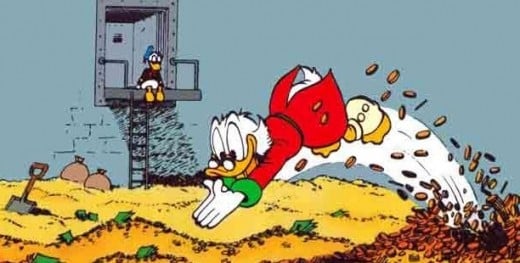
Redistribution for me, the cold knife of capitalism for you, sucker
The third fallacy made by people such as Levchin is to pretend that the concept of “redistribution” is an absolute, without actually defining their terminology.
But what does the word really mean?
Very often, we only think of the type of social programs I mentioned above (and very often not even all of those). In truth, anything is redistribution. The low-income worker does not pay the same in taxes to maintain the roads, yet he uses them the same as the wealthy citizen. The rich man’s taxes are going to subsidize the poor man’s road usage.
But subsidies for business are redistribution. Tax breaks for the wealthy – who actually often pay less in taxes as a percentage of their incomes than working people. Billionaire Warren Buffet once pointed out that his secretary pays more tax than he does.
As well, different types of income are taxed differently. Will it shock anyone if I mention that the types of income earned by wealthy people – largely capital gains and dividend – is taxed at a much lower rate than that earned by the sweat and effort of working people?
Some wealthy individuals – such as Donald Trump, who once bragged about such a thing – and massive corporations who make billions of dollars in profits such as Amazon and Netflix, pay no taxes at all, even though they benefit greatly from our capitalist system.
Under the adage of “a penny saved is a penny earned,” or in this case, a penny not taxed – or taxed less -- is a penny subsidized. Or, in other words, a penny redistributed.
Because anything the wealthy don’t pay to maintain our society – our schools, our police, our military, our roads – has to be made up by people who actually work for a living.
And of course, there’s the direct re-distribution in the form of direct subsidies: corporate farmers, oil and gas producers, various manufacturers receive millions and billions of dollars in direct subsidies and tax write-offs from government.
This is redistribution that the mega-wealthy like Max Levchin don’t mention.
When the banks, car manufacturers, and other corporations were offered billions in bailouts after the collapse of the economy in 2008, you didn’t hear people like Max Levchin protest – “Oh, no! Don’t redistribute billions to me!”
They only demand that no food or health-care or housing be redistributed to the mass of working Americans.
So, for the likes of Max Levchin, the motto is, Redistribution for me, steel-cold capitalism for you. Sucker!
